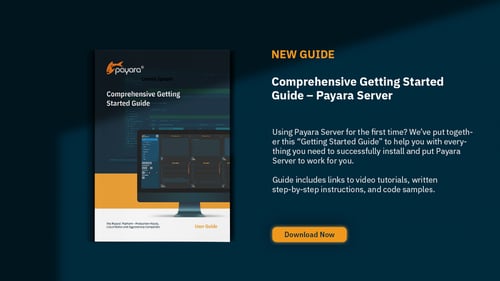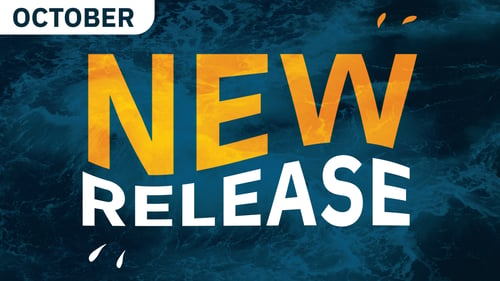Posts tagged Payara Platform 5
What Is Payara Embedded?
Published on 07 Jan 2022
by Rudy De Busscher
Topics:
Payara Platform 5,
Payara Embedded
|
0 Comments
Comprehensive Getting Started Guide – Payara Server
Published on 23 Dec 2021
by Priya Khaira-Hanks
Topics:
JakartaEE,
Payara Platform 5,
Payara Platform,
getting started with Jakarta EE
|
0 Comments
Payara Platform is an open source middleware platform that supports Jakarta EE (formerly Java EE) applications in ANY environment: on premise, in the cloud, or hybrid.
It is a solution to GlassFish problems such as lack of supported Docker images and automation assistance, no internal monitoring system and an absence of modern security standards and critical server event alerts and notfiers. It is also an alternative to Oracle Weblogic, Wildfly, JBoss EAP, WebSphere, OpenLiberty and more.
Our previous Getting Started guide had not been updated with improvements to Payara Platform, such as our hide password with password aliases feature - and did not contain comprehensive guides to integration with other technologies.
Configure the Details of the GZIP Compression in Payara Platform October 2021 Release
Published on 25 Oct 2021
by Rudy De Busscher
Topics:
Payara Platform 5,
New Releases
|
0 Comments
Data is sent to and received from the endpoints within Payara Platform. When large chunks of data are sent to the client in response to a request, it might be an option to compress the data when the bandwidth is limited. This speeds up the transfer, but requires more CPU on the server and the client to perform the compression and handle the response.
With the October 2021 release, the Payara Platform allows configuring the compression level and the compression algorithm so you can better tune your environment for your requirements.
Client Certificate Validation in Payara Platform October 2021 Release
Published on 22 Oct 2021
by Debbie Hoffman
Topics:
Security,
Payara Platform 5,
New Releases
|
0 Comments
The Client Certificates security extensions continue to receive improvements in this release. In previous releases (July and September 2021) we added Client Certificate Authentication improvements, giving the ability to define multiple TrustStores and implement a SPI to allow developers to perform additional checks on the Client Certificate.
Previously, any Client Certificate that is used and matched within the KeyStore was accepted, even when the certificate was expired. Starting in the October 2021 releases (Payara Community 5.2021.8 and Payara Enterprise 5.32.0), using the newly developed SPI, we have implemented an additional check when using the Client Certificate authentication option to ensure the certificate is valid.
Why Payara Platform Only Supports LTS Versions of JDK
Published on 29 Sep 2021
by Rudy De Busscher
Topics:
Payara Platform 5,
Java 8,
Java 11,
java 17
|
0 Comments
Did You Know? If Payara Server Seems Slow, Try This
Published on 20 May 2021
by Debbie Hoffman and Rudy De Busscher
Topics:
Payara Platform 5
|
0 Comments
The 2021 Payara Platform Survey was completed in April. Our surveys help us shape the future of Payara Server and Payara Micro as they give us an idea what features and enhancements the community would like to see in future releases. Surveys also provide an opportunity for you to tell us what needs to improve and after finding 14% of respondents indicated the speed of deployment is not as fast as they would like, we wanted to share a tip.
Payara Server 5における接続プールのご紹介
Published on 18 May 2021
by Arjan Tijms
Topics:
Connection Pools,
Japanese language,
Payara Platform 5,
Payara Server
|
2 Comments
How to Use OpenIdConnect with Payara Platform to Achieve Single Sign-on
Published on 22 Apr 2021
by Rudy De Busscher
Topics:
Security,
Payara Platform 5
|
8 Comments
When a user needs to access multiple applications in your environment, you should not require authentication for each application. If the user has already been authenticated for one of the applications, he or she should should not be asked for credentials when he accesses one of the other applications during the same browser session. This concept is called Single Sign-on where the authentication credentials are 'shared' in the environment and can be used by any application in that environment.
How to Connect Payara to External Hazelcast Grid
Published on 25 Mar 2021
by Rudy De Busscher
Topics:
Production Features,
Hazelcast,
Payara Platform 5
|
2 Comments
The Domain Data Grid feature of the Payara products is powered by the Hazelcast library. It provides the necessary functionality for the Deployment Group (clustering functionality), Cache functionality, CDI cluster singleton, and monitoring data storage within Payara to name just a few features.
Since Hazelcast can cluster multiple instances into a data grid, it is possible to create a Hazelcast grid that comprises the Payara instances and some other instances included in other applications running outside of Payara.
Getting Started with Jakarta EE 9: Hello World
Published on 18 Mar 2021
by Rudy De Busscher
Topics:
JakartaEE,
Payara Platform 5,
getting started with Jakarta EE
|
0 Comments
Introduction
The release of Jakarta EE 9, at the end of 2020, was in many ways a historic event. The Java Enterprise framework is already 20 years old, having its first release in 1999. It has changed names a few times but the main concepts of the first release can still be found in this new release. During all those years, it has adapted itself to keep it up to date but has always adhered to its main principle of stability and backward compatibility.








